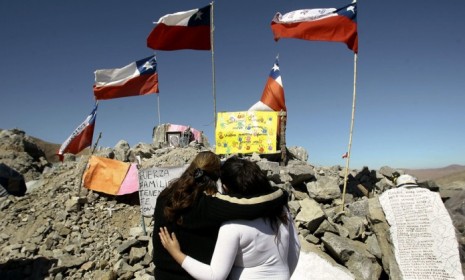The 'incredible' life of the trapped Chilean miners
Chile's 33 "miracle miners" have been trapped underground for more than a month. What are they doing down there?

A free daily email with the biggest news stories of the day – and the best features from TheWeek.com
You are now subscribed
Your newsletter sign-up was successful
The 33 Chilean miners trapped 2,300 feet underground since Aug. 5 are living a life nobody's ever experienced — the previous record for surviving in a collapsed mine is 25 days. The men, age 19 to 63, will remain in their cramped, broiling quarters until Christmas, Chilean officials estimate. As they try to stay healthy, occupied, and optimistic, here are some details on their "incredible" day-to-day life in 4,500 square feet of "hell":
1. Everything they're sent is less than 3.2 inches wide
The miners' lifelines are three narrow boreholes extending down from the surface to their chamber. All rations and supplies — 5 liters of water a day each; 2,000 calories worth of food, including nutrition shakes, bread, fruit, and ham; toiletries; lightweight, fungus-resistant clothing; batteries; medicine, etc. — are lowered in 3.19-inch-wide tubes called "doves." The packages are sent 24 hours a day.
The Week
Escape your echo chamber. Get the facts behind the news, plus analysis from multiple perspectives.

Sign up for The Week's Free Newsletters
From our morning news briefing to a weekly Good News Newsletter, get the best of The Week delivered directly to your inbox.
From our morning news briefing to a weekly Good News Newsletter, get the best of The Week delivered directly to your inbox.
2. The miners have a personal trainer
Starting this week, a personal trainer is leading the men through a one-hour daily workout, via a closed-circuit video feed. This is important to keep them in good spirits, says Chilean health minister Jaime Mañalich, but also because when the miners are rescued, they'll need 35-inch waists, or smaller, to make it out the 2,300-foot hole being dug for them. Most Americans would need the exercise: The average U.S. man has a 39.7-inch waist.
3. They will still have to work
Another reason the miners have to stay in shape: When their escape route's pilot hole breaks through, they'll need to start working to clear away up to 4,000 tons of rock and rubble, in constantly rotating shifts.
A free daily email with the biggest news stories of the day – and the best features from TheWeek.com
4. They have an iPod
The iPod is hooked up to speakers, to encourage communal listening. But since they don't have electricity, they send it up to be recharged. They also have TV and movies piped down to them on fiber optic cable and projected onto an improvised screen. (Watch the miners cheer on their national soccer team)
5. Gambling is encouraged
Early on in their ordeal, the miners created a makeshift casino out of a table and dirty red cloth. The games include dominoes and poker. From a video they made, it looks like the miners are "whiling away the afternoon in some darkened gambling dive," says David Jones in Britain's Daily Mail.
6. They're staying in close touch with their families
The miners' family members, some of them living in their own improvised camps near the rescue site, got to see their loved ones 24 days after the collapse, in a 45-minute video the miners recorded on a tiny video camera sent through the borehole. The video included a tour of the shelter and personal messages to family members. Later, a phone system was set up so the miners could speak directly to their relations above.
7. The miners are getting pep talks from the Alive survivors
Four Uruguayan ex-rugby players who made it through 10 weeks in the snowy Andes following a 1972 plane crash — a saga recounted in the film Alive (1993) — traveled to the mine in early September to encourage the miners and their families. "They are much luckier than we were because they didn't have to make the terrible decision to eat their friends," noted crash survivor Jose Luis Inciarte, 62.
8. Even underground, day is bright and night is dark
On the advice of NASA doctors and engineers, the miners have created a lighted "day" area and a perpetually dark "night" area, using the two spots to create some semblance of a regular day. A schedule is important for mental well-being amid all the uncertainty, NASA experts say, and vitamin D supplements will help alleviate the sun deprivation.
9. They're allowed to smoke
Last week, Chilean authorities decided that the chamber's air ventilation system could handle lighted cigarettes, so they started sending down two packs of smokes a day. Previously, the miners had been using nicotine patches to cope with their addictions.
-
 6 exquisite homes with vast acreage
6 exquisite homes with vast acreageFeature Featuring an off-the-grid contemporary home in New Mexico and lakefront farmhouse in Massachusetts
-
 Film reviews: ‘Wuthering Heights,’ ‘Good Luck, Have Fun, Don’t Die,’ and ‘Sirat’
Film reviews: ‘Wuthering Heights,’ ‘Good Luck, Have Fun, Don’t Die,’ and ‘Sirat’Feature An inconvenient love torments a would-be couple, a gonzo time traveler seeks to save humanity from AI, and a father’s desperate search goes deeply sideways
-
 Political cartoons for February 16
Political cartoons for February 16Cartoons Monday’s political cartoons include President's Day, a valentine from the Epstein files, and more